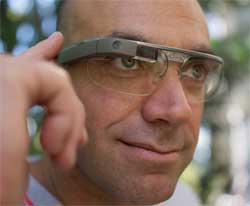Google partners with Luxottica for Internet eyewear

The California-based technology company billed the partnership with Luxottica as its "biggest step yet into the emerging smart eyewear market."
Luxottica brands include Oakley, Alain Mikli, Ray-Ban, and Vogue-Eyewear.
The announcement in a Google blog post came as the web company sought to burnish the Glass image ahead of its expected debut in the US market this year.
Google last week sent out a release to debunk Glass myths including that it invades privacy, distracts wearers, and is for "technology-worshipping geeks."
"If someone wants to secretly record you, there are much, much better cameras out there than one you wear conspicuously on your face and that lights up every time you give a voice command, or press a button," Google said.
"If a company sought to design a secret spy device, they could do a better job than Glass," the blog said.
Google in February gave early adopters of its Internet-connected eyewear a bit of advice: don't be "Glassholes."
Code of conduct
It was the final suggestion in a recommended code of conduct posted online for software developers and others taking part in an Explorer programme providing early access to Google Glass.
Google appeared intent on avoiding the kinds of caustic run-ins that have seen some Glass wearers tossed from eateries, pubs or other establishments due to concerns over camera capabilities built into devices.
Don't be "creepy or rude (aka, a "Glasshole")," Google said in a guide posted online for Explorer programme members.
"Respect others and if they have questions about Glass don't get snappy," it said.
Google suggest Glass wearers be polite and offer demonstrations to possibly win over the wary. Glass fans were advised it is proper to follow the same rules set down for smartphone use in businesses.
"If you're asked to turn your phone off, turn Glass off as well," Google said.
"Breaking the rules or being rude will not get businesses excited about Glass and will ruin it for other Explorers," it added.
Google early this year unveiled a partnership with US vision insurer VSP to make prescription Glass and to reimburse some of the costs under health benefits.
That does not include the US$1,500 price for Glass, which is in a test phase with a small number of "explorers."
Glass connects to the Internet using Wi-Fi hot spots or, more typically, by being wirelessly tethered to mobile phones. Pictures or video may be shared through the Google Plus social network.
During the testing phase, developers are creating apps for the eyewear, which can range from getting weather reports to sharing videos to playing games.
Source: AFP via I-Net Bridge
Source: I-Net Bridge

For more than two decades, I-Net Bridge has been one of South Africa’s preferred electronic providers of innovative solutions, data of the highest calibre, reliable platforms and excellent supporting systems. Our products include workstations, web applications and data feeds packaged with in-depth news and powerful analytical tools empowering clients to make meaningful decisions.
We pride ourselves on our wide variety of in-house skills, encompassing multiple platforms and applications. These skills enable us to not only function as a first class facility, but also design, implement and support all our client needs at a level that confirms I-Net Bridge a leader in its field.
Go to: http://www.inet.co.za








